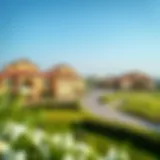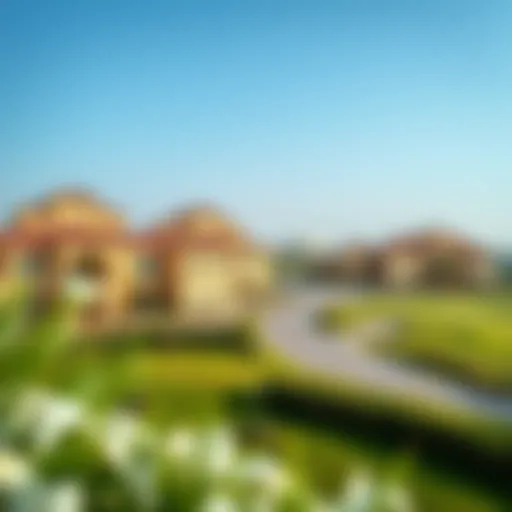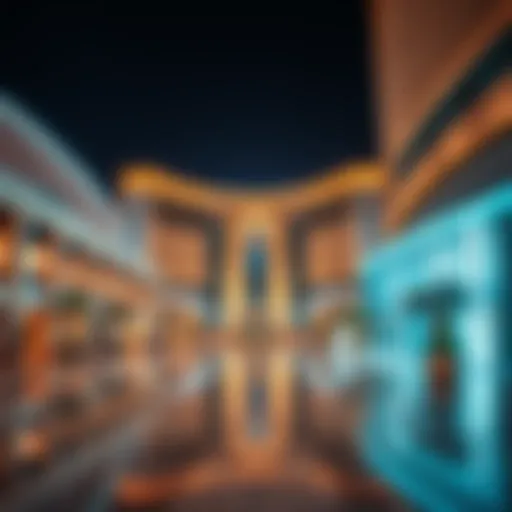Exploring the United Arab Emirates: Culture and Progress
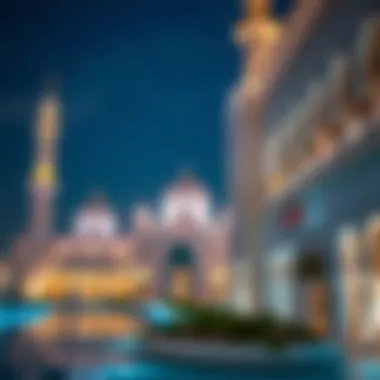

Intro
The United Arab Emirates stands as a remarkable fusion of rich history, modern innovation, and diverse cultures that collectively shape its unique identity. Travelers and investors alike find themselves drawn to this enlightening region, not only for its breathtaking skyscrapers and luxurious lifestyles but also for its profound heritage and evolving socio-economic landscape.
The UAE is often perceived through the lens of its opulent cities; however, the essence of this nation encompasses much more - the warmth of its people, the subtleties of its traditions, and the intricate balance it strikes between the past and the future. This article seeks to unravel the multifaceted nature of the UAE, digging deep into its landscapes, culture, economy, and the elements that make it a truly unique destination.
From the bustling souks of Dubai to the serene deserts of Abu Dhabi, every corner of this nation tells a different story. By examining the historical context, social fabric, and economic strategies that define the UAE, we aim to provide a comprehensive understanding for investors, home buyers, and property managers whose interests lie within this vibrant market.
Market Trends
Current Real Estate Market Conditions
The real estate market in the UAE has undergone a significant transformation over the past decade. No longer limited to the glitzy buildings of cities like Dubai, the market now serves as a reflection of broader economic trends and demographic shifts. High demand for residential properties has been driven by a growing population, with expats continuing to flood in, drawn by a favorable business environment and tax incentives.
Recent statistics indicate that property prices are stabilizing after years of volatility, particularly in prime locations. Areas like Dubai Marina and Downtown Dubai remain hot spots for investment, supported by high rental yields that attract both foreign and local investors. In contrast, more suburban areas, such as Dubai South and Yas Island, are quickly gaining traction, showing potential for future development.
Future Projections and Growth Areas
Looking ahead, analysts predict that the UAE's real estate market will continue to flourish, particularly as the country embraces initiatives aimed at sustainable development and tourism enhancement.
- Emerging markets include:
- Sharjah: Benefiting from warehouse and industrial developments.
- Ajman: Increasing investment in affordable housing projects.
Technology and innovation will also play crucial roles in shaping the future. The incorporation of smart home technologies in new developments indicates a trend towards sustainable living solutions, aligning with global priorities.
'Sustainability is more than a buzzword; it's a business model for future developments in the UAE,' says architectural expert Maya Al-Badri.
Investment Insights
Best Areas for Real Estate Investment
For investors keen on tapping into the UAE's real estate potential, some areas stand head and shoulders above the rest:
- Dubai Marina: Known for luxury living with a booming short-term rental market.
- Abu Dhabi's Saadiyat Island: Emerging as a cultural and educational hub, making it attractive for families.
- Ras Al Khaimah: Offers affordability coupled with government incentives aimed at promoting long-term residency.
Tips for First-Time Investors
Investing in property can be daunting, especially for first-timers. Here are some key tips:
- Research Locations: Understand the growth areas, infrastructure plans, and demographic trends. Websites like Property Finder can be handy.
- Understand Ownership Rights: Many areas allow foreign ownership; be familiar with regulations.
- Hire a Local Expert: A knowledgeable agent can help navigate the processes smoothly.
Historical Context of the United Arab Emirates
Understanding the historical context of the United Arab Emirates is crucial for grasping its current identity. This region has transitioned from a collection of disparate tribes focused on trade and survival to a unified nation that plays a significant role on the global stage. The evolution of the UAE not only reflects its rich past but also exemplifies the potential for development and innovation.
Formation of the United Arab Emirates
The formation of the United Arab Emirates in 1971 was a watershed moment for the Gulf region. Prior to this, the area comprised several emirates, each governed separately. The British presence has been significant, with the Trucial States existing under a protectorate agreement since the 19th century. However, the wind of change started blowing as regional and geopolitical dynamics shifted in the mid-20th century.
Sheikh Zayed bin Sultan Al Nahyan, often regarded as the father of the nation, played a pivotal role in unifying these emirates. His vision helped ease political tensions and foster cooperation among the seven emirates: Abu Dhabi, Dubai, Sharjah, Ajman, Umm Al-Quwain, Fujairah, and Ras Al Khaimah. The formal declaration on December 2, 1971, marked a new chapter, where independence and unity were celebrated. This day is now commemorated as the UAE’s National Day, reflecting the pride and aspirations of its people.
"Unity is strength - if you work together, you will win." - Sheikh Zayed
Key Historical Events
Throughout its history, the UAE has experienced several key events that have influenced its political and social landscapes:
- Discovery of Oil (1958): The discovery of oil transformed the economy and infrastructure of the UAE, propelling it from a largely agrarian society to a vibrant, modern state. The oil boom resulted in rapid urban development, drawing expatriates and investment.
- Formation of OPEC (1960): The UAE's membership in the Organization of the Petroleum Exporting Countries set the stage for a significant role in global oil politics, positioning the UAE as a major player in energy markets.
- Gulf War (1990-1991): The Gulf War had far-reaching implications, reinforcing the UAE's necessity for military cooperation with allies, including the United States, and bringing about significant changes in defense policies.
These events, among others, have sculpted the realities of the present-day UAE, instilling a sense of resilience and adaptability.
Traditional Practices and Their Lasting Influence
Despite its rapid modernization, traditional practices hold a cherished place in UAE society. The blend of ancient customs and contemporary life creates a unique cultural tapestry:
- Falconry, a traditional sport and symbol of prestige, continues to be a popular pastime, showcasing the UAE's links to its Bedouin heritage.
- Bedouin hospitality remains a cornerstone of social interaction. Guests are often welcomed with qatari coffee and dates, reflecting the warmth that characterizes Emirati culture.
- The art of storytelling through naqut (oral traditions) transmits values and history, engaging younger generations and ensuring the survival of cultural narratives.
The intersection of tradition and modernity manifests in various forms, from architecture to community festivals, which engage the public in celebratory events that honor their heritage while embracing progress.
Cultural Fabric of the UAE
The United Arab Emirates, often referred to by its initials, UAE, showcases a rich cultural fabric that stands as a testament to its dynamic evolution. This section seeks to unravel the intricate layers of this diverse identity, emphasizing the paramount importance of cultural nuance in understanding the UAE's essence. Interwoven within its historical context, the fabric is not merely a collection of colorful threads but a rich tapestry representing various nationalities, traditions, and lifestyles. The cultural dynamics influence not just how residents interact but also how investors and homebuyers perceive opportunities within this vibrant society.
Diversity in Demographics
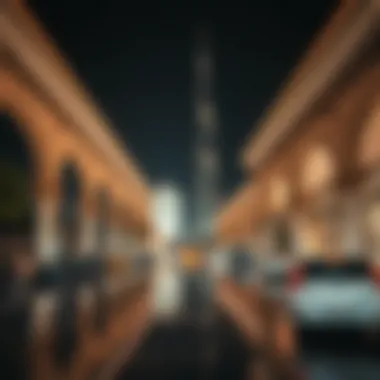

Diversity within the demographics of the UAE is striking. The nation’s population is a melting pot of cultures, with Emiratis comprising around 11% of the total populace and expatriates making up the bulk. People from India, Pakistan, Bangladesh, and numerous other countries coexist harmoniously, contributing to a multicultural environment. This blend doesn’t just add flavor to everyday life; it drives economic activities as well, with expatriates bringing different skills, knowledge, and customs.
- Expatriate Influence: Different communities enrich the social landscape with festivals, food markets, and art exhibitions. The Diwali festival celebrated by the Indian community or Eid celebrations among Emiratis reflect the harmony and coexistence of various cultures.
- Social Integration: Various government initiatives, like tolerance programs and cultural exchanges, actively promote social integration. Understanding one another's values fosters respect and unity.
Language and Dialects
Language in the UAE serves as both a bridge and a barrier. While Arabic is the official language, the linguistic landscape is dominated by English due to its wide use among the expatriate communities. Various dialects can be heard echoing through the bustling markets and posh malls, showcasing a mosaic of relations.
- Arabic Dialects: The local Emirati dialect of Arabic reflects the cultural heritage, incorporating Bedouin influences and modern slang. Visitors often find themselves enchanted by the rhythmic sound of local expressions unique to the region.
- Global Influence: English is not just an economic necessity but a medium of education and business. Learning basic Arabic phrases can enhance interaction, making expatriates feel more engaged with the culture around them.
Culinary Traditions
Culinary traditions in the UAE narrate stories of its cultural evolution. With dishes like Al Harees and Shawarma prevalent in households, the food scene is incredibly diverse.
- Traditional Dishes: Traditional meals weave together Bedouin roots and Persian influences, with spices playing a critical role. The inclusion of saffron, cumin, and sumac in cooking highlights the region's affinity for flavor.
- Modern Fusion: The thriving food scene also embraces global influences, with gourmet dining options sprouting across cities. Upscale eateries serving bespoke dishes blend local ingredients with international techniques.
The essence of the UAE lies in its ability to forge a unique identity while celebrating the myriad influences that shape its cultural landscape.
Architectural Wonders of the UAE
The architectural landscape of the United Arab Emirates is nothing short of a modern marvel, where skyscrapers pierce the clouds and traditional structures tell stories of a rich cultural heritage. This section aims to unpack the significance of this architectural prowess, illustrating how each structure represents not just a physical site but a testament to the nation’s rapid growth and its commitment to both innovation and preservation.
The Splendor of Modern Architecture
In the UAE, modern architecture is not merely a collection of buildings; it's an art form that embodies the nation's vision. From the iconic Burj Khalifa in Dubai, standing tall as the tallest building in the world, to the dynamic curves of the Louvre Abu Dhabi, each is a narrative in itself. These structures attract investors and tourists alike, positioning the UAE as a global hub for business and leisure.
- The construction techniques employed here are cutting-edge, utilizing materials that resist the harsh climate while enhancing aesthetic appeal.
- Additionally, many buildings feature sustainable designs, which speak to a growing awareness of environmental concerns.
- One cannot ignore the role of innovative architects like Zaha Hadid and Norman Foster, whose influences can be seen across the landscape of the nation.
The architectural splendor isn't just for show; it is also intertwined with commercial benefits, reinforcing the UAE’s economy by drawing in millions of visitors every year.
Preservation of Heritage Sites
While the modern skyline dazzles, the UAE has not lost sight of its roots. Heritage sites such as Al Fahidi Historical Neighborhood in Dubai and Qasr Al Hosn in Abu Dhabi act as vital links to the past. These sites represent the UAE's strong commitment to preserving its traditional way of life in the face of rapid development.
“Each brick laid in these historic buildings carries the weight of a story waiting to be discovered.”
- The preservation efforts are not just about maintaining old structures but also about educating the public, both local and international, about the region's history and cultural identity.
- Artisans and craftsmen are employed to retain traditional architectural methods, ensuring that skills passed down through generations do not vanish.
- The UAE sees this preservation as a strategy for tourism, where visitors are intrigued not only by the modern wonders but also by its deep-rooted history.
Influence of Islamic Architecture
The aesthetic bases for much of UAE's architecture are deeply rooted in Islamic principles. This influence is evident in buildings like the Sheikh Zayed Grand Mosque, which showcases intricate carvings, grand domes, and expansive courtyards. Islamic architecture often emphasizes geometric patterns, symmetry, and the interplay of light – elements seamlessly integrated into the larger architectural narrative of the UAE.
- These design principles adapt beautifully to both contemporary and traditional structures, making them cohesive yet distinct in their representation of the culture.
- The use of spacious arches, calligraphy, and mosaics not only beautifies the external façades but also enhances the spiritual atmosphere within these buildings.
- Furthermore, designs are mindful of social customs, accommodating both communal and intimate gatherings, further solidifying the role of architecture in UAE's societal fabric.
In summary, the architectural wonders of the UAE are a vivid tapestry of its journey, illustrating how tradition and modernity can coalesce harmoniously. Whether through towering skyscrapers that signal progress or heritage sites that remind visitors of the country's emotional roots, there is a profound story etched in every corner of this nation.
For further reading, you can explore the unique architectural practices in the UAE at Encyclopedia Britannica and Wikipedia.
Economic Landscape of the United Arab Emirates
The economic landscape of the United Arab Emirates (UAE) serves as a cornerstone for understanding its development and prosperity. It echoes the visionary strategies that transformed a cluster of coastal tribes into a hub of international trade, finance, and tourism. Each element of this landscape works in tandem, influencing not only local life but also extending its reach across the globe. Key topics include the country's reliance on oil and natural resources, the diversification initiatives, and the booming tourism sector, all of which shape the future of the UAE.
Oil and Natural Resources
Oil and natural resources have been the bedrock of the UAE's economy since the 1960s, significantly impacting the country's wealth and infrastructure development. The discovery of oil in the emirates, especially in Abu Dhabi, catapulted the nation onto the global stage. Not only did it provide a source of revenue that funded ambitious development projects, but it also attracted foreign investment, leading to the rapid modernization of the country's cities and services.
With vast reserves, the UAE remains one of the top oil producers in the world. However, there's a growing consciousness regarding the finite nature of these resources. The government is aware that reliance solely on oil jeopardizes future economic stability. Thus, conversations about sustainability and responsible management of resources have become prominent.
As environmental concerns rise, initiatives are in place to find cleaner methods of extraction and lower emissions in the oil sector. In the longer run, these efforts aim to balance the benefits of oil with the need to transition toward more sustainable energy sources.
Diversification of the Economy
In response to the volatility of oil markets and the knowledge that oil reserves will eventually deplete, the UAE has embarked on an ambitious path of economic diversification. This strategy aims to reduce dependence on hydrocarbons and foster growth in non-oil sectors.
Several initiatives have been put into motion to support this transition, including:
- Investment in Technology and Innovation: The UAE positions itself as a tech hub in the Middle East, focusing on industries like fintech, artificial intelligence, and clean energy. The establishment of free zones with 100% foreign ownership provides an appealing environment for startups and global investors.
- Real Estate and Construction: The skyscrapers of Dubai symbolize the surge in the real estate sector, which has attracted both domestic and foreign investors. Major projects like the Expo 2020 have intensified interest in real estate and associated services.
- Manufacturing and Trade: The UAE is also enhancing its manufacturing capabilities. Industries such as pharmaceuticals and technology-driven production are getting more attention, aiming to strengthen the country's self-sufficiency.
These diversification efforts not only support economic growth but also create job opportunities, uplifting various sectors that bridge cultural and geographical gaps.
Impact of Tourism on Economic Growth
Tourism has become a significant pillar within the UAE's economy, reinforcing the nation's appeal as a global destination. The beautiful landscapes, luxury resorts, and rich cultural experiences draw millions of visitors each year. The tourism sector not only creates jobs but also stimulates growth in several ancillary industries such as transportation, hospitality, and retail.
As of the latest data, tourism accounts for roughly 11% of the UAE's GDP, reflecting its importance in ongoing economic strategies. The country’s successful advocacy of events like the Dubai Shopping Festival and the Abu Dhabi Film Festival has contributed to its visibility and attractiveness on the world map.
“The wealth generated by tourism permeates through local economies, enhancing both small businesses and large enterprises alike.”
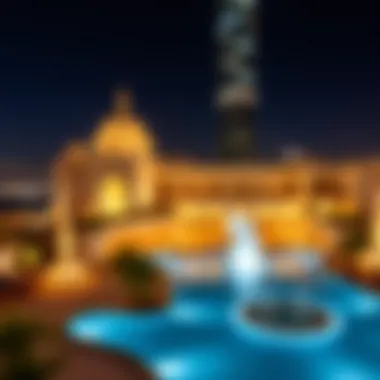

Additionally, the UAE government has introduced strategies to boost tourism further by promoting cultural and heritage sites, enhancing public transport systems, and investing in sustainability practices that cater to environmentally conscious travelers. Wider initiatives, such as Visa on Arrival policies and improved air connectivity, facilitate an increase in visitor numbers and spending.
For more detailed information, consider exploring these resources:
Societal Dynamics in the UAE
The societal dynamics in the United Arab Emirates are intricate and vital to understanding its multifaceted identity. These dynamics illustrate how traditional values interact with modern influences in a society that embraces both the past and the future. Investors and homebuyers need to recognize how these societal elements can shape the market and community life.
Family and Community Structures
Family remains the cornerstone of social structure in the UAE. This is not just about blood relations; it's about belonging, support, and kinship. In Emirati culture, families extend beyond the nuclear model to include broader relations. Grandparents play pivotal roles, imparting wisdom and values that emphasize respect and communal support. This strong familial network can be particularly appealing for potential residents or investors who value close-knit communities.
- Roles within Families
Families operate with defined roles, often influenced by cultural traditions. Men traditionally are seen as providers while women manage the household. Yet, the lines are increasingly blurring as women play more active roles outside the home. - Community Engagement
Events like weddings, Islamic holidays, and other communal gatherings serve to strengthen ties within these networks. Investors should note how communal values manifest in community support, which can impact local business growth.
Gender Roles and Advances
In the past, gender roles in the UAE were quite traditional, often reflecting a conservative approach. Nowadays, there's a significant shift towards gender equality and women empowerment. Women in the UAE now contribute not only to the family but also to the economy, politics, and social spheres.
- Representation in Leadership
Women hold high-ranking positions in government and business, with women leading initiatives in health, education, and technology. For instance, the UAE's Vision 2021 emphasizes women's empowerment as a pillar for progress. - Promotion of Gender Equity
Awareness campaigns and educational programs have been set up to combat stereotypes and promote the value of women in society. This shift is crucial for investors looking for equal opportunities and a diverse workforce.
Education and Youth Empowerment
Education is a priority for the UAE, reflecting its commitment to developing human capital. The nation has invested heavily in creating a knowledge-based economy, recognizing that today’s youth are tomorrow's leaders.
- Access to Education
The UAE offers free education for its citizens at all levels, which promotes literacy and skill development among the youth. Schools focus on diverse curricula, including STEM education, preparing students for future challenges. - Youth Initiatives
Programs like the Mohamed bin Rashid Al Maktoum Foundation champion youth empowerment, enabling young people to partake actively in shaping their nation's future.
"By investing in our youth, we are investing in the future of the UAE," states Dr. Ahmad Belhoul Al Falasi, Minister of State for Entrepreneurship and SMEs.
For investors and property managers, understanding the societal dynamics, including family structures, gender roles, and educational advancements, can provide invaluable insights into the local market. These elements also influence lifestyle choices, housing preferences, and consequently, property values.
The UAE in the Global Context
The United Arab Emirates holds a significant place in the global landscape, largely due to its strategic positioning, burgeoning economy, and its dedication to fostering fruitful relationships across borders. Its role as a bridge between East and West is not just geographical but also cultural and economic. This section examines how the UAE has maneuvered its way into vital spheres of influence and why it’s essential for investors, home buyers, and property managers to take heed of its global positioning.
Diplomatic Relations and Global Partnerships
In the world of diplomacy, the UAE is often viewed as a key player. With a clear vision for enhancing mutual prosperity, it's established various bilateral and multilateral relationships that extend beyond typical political ties. The UAE's alliances include countries in Europe, Asia, and North America.
- Strategic Alliances: The UAE has signed numerous treaties emphasizing trade, investment, and security. For instance, partnerships with countries like India and China underscore mutual economic benefits, allowing for easier trade flows and investment opportunities.
- Conflict Resolution: Leveraging its diplomatic channels, the UAE has acted as an intermediary in regional conflicts, contributing to peace in the Middle East. This constructive role not only boosts its reputation but also opens doors for foreign investments, especially in real estate and tourism sectors.
Having a foothold in such a globally recognized market is invaluable for those looking to invest in property or start a business in the UAE.
The UAE's Role in International Organizations
The UAE actively participates in pivotal international organizations such as the United Nations, the World Trade Organization, and the Gulf Cooperation Council. Through these memberships, it plays a crucial role in addressing global challenges, from climate change to trade disputes.
- Voice on Global Issues: By hosting conferences and engaging in discussions, the UAE amplifies its voice regarding pressing matters. The country has taken the initiative in climate action by committing to sustainability efforts aligned with the United Nations Sustainable Development Goals.
- Economic Forums: As a member of organizations like the World Economic Forum, the UAE showcases its economic potential while engaging in dialogues that attract investors and global business leaders.
With a stable government and commitment to international collaboration, property management becomes a more appealing avenue in the UAE for those seeking opportunity.
Cultural Diplomacy and Soft Power
Cultural diplomacy is another important aspect of the UAE's global presence. The country's efforts to promote its culture and heritage help solidify its reputation on the world stage.
- Cultural Initiatives: Events like the Abu Dhabi Festival and the Sharjah Biennial highlight the UAE’s investment in the arts, showcasing local and international talent. This cultural engagement draws in tourists and investors, fostering an environment ripe for economic growth.
- Educational Exchange: The UAE has also created programs that facilitate educational exchange, inviting universities and institutions from around the globe to establish campuses in the Emirates. This exchange of ideas not only enriches local culture but also attracts students, resulting in increased demand for housing and economic activity in related sectors.
As the UAE employs its soft power to build connections, it ensures that investors and property managers can anticipate a growing demand for developments.
"The UAE is not merely a place to conduct business; it is a cultural hub where diversity thrives and innovation is at the forefront."
Investing in the UAE, therefore, presents an opportunity not just to tap into a rising market but also to engage with a dynamic society that values growth, sustainability, and cultural richness.
Environmental Initiatives in the UAE
The United Arab Emirates has emerged as a key player in global discussions surrounding environmental sustainability. Not only does the country strive to preserve its unique ecosystems, but it also aims to align its growth with the principles of sustainability. This section highlights critical initiatives, from setting ambitious environmental targets to fostering innovation in clean energy, opening avenues for investment, helping home buyers utilize sustainable features, and enabling property managers to implement green strategies.
Sustainable Development Goals
In 2015, the UAE committed to the United Nations' Sustainable Development Goals (SDGs), embracing a comprehensive approach to development. This commitment addresses urgent global challenges including poverty, inequality, and climate change. The UAE's strategies integrate social, economic, and environmental dimensions, paving the way for future prosperity. Specific SDGs relevant to the UAE's initiatives include:
- Goal 7: Ensure access to affordable, reliable, sustainable, and modern energy for all.
- Goal 13: Take urgent action to combat climate change and its impacts.
- Goal 15: Protect, restore and promote sustainable use of terrestrial ecosystems.
Adopting these SDGs not only emphasizes the nation's accountability but also enhances investors' confidence in the UAE's commitment to a sustainable future.
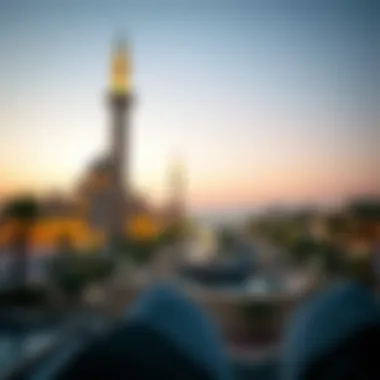

Conservation Efforts and Biodiversity
The UAE's geographical and climatic diversity establishes it as a vital host for various ecosystems, housing several endangered species and offering unique habitats. To protect these natural resources, initiatives focus on:
- The Sheikh Zayed Book Award: Launched to promote environmental awareness through literature and local culture.
- National Parks: Such as the Dubai Desert Conservation Reserve, which shelters flora and fauna while encouraging eco-tourism.
- Biodiversity Stewardship Programs: Integrating local community engagement and scientific research.
Such initiatives highlight a strong dedication to conserving the environment, allowing future generations to experience the UAE's incredible biodiversity while attracting eco-conscious tourists and investors.
Renewable Energy Projects
Renewable energy plays a pivotal role in the UAE's environmental initiatives. The country is rapidly transitioning its energy production from fossil fuels to renewable sources. Prominent projects include:
- Masdar City: A planned city that relies on renewable energy, showcasing innovations in sustainable living.
- Noor Abu Dhabi Solar Plant: This project is one of the largest solar power plants in the world, making strides towards achieving target emission goals.
- Barakah Nuclear Energy Plant: The first nuclear power station in the Arab world, offering a low-carbon solution to energy needs.
By investing in renewable energy, not only does the UAE lessen its carbon footprint, but it also attracts well-informed investors, guiding the shift from traditional energy reliance to a sustainable future.
"The UAE is transforming its landscape into one of sustainable practices, ensuring harmony between its growth ambitions and environmental preservation."
The combination of sustainable development goals, conservation efforts, and renewable energy investments marks the UAE's determination to combat climate change while also appealing to a market increasingly inclined toward sustainability. Eager investors can find opportunities ripe for the picking, as home buyers and property managers alike seek to engage in projects that align with these environmental objectives.
Arts and Entertainment Culture in the UAE
The arts and entertainment culture in the United Arab Emirates is not just a reflection of the nation’s creativity, but rather a celebration of its rich history and vibrant expression. This narrative holds significance, especially in the context of how the UAE positions itself in the global cultural landscape. The interplay of tradition and modernity has allowed the UAE to foster a unique artistic identity, making it a vibrant hub that attracts influencers and innovators alike.
Emergence of the Art Scene
Over the past few decades, the art scene in the UAE has grown exponentially. Cities like Abu Dhabi and Dubai have transformed into epicenters for contemporary art, drawing attention from around the globe. Noteworthy museums such as the Louvre Abu Dhabi and the upcoming Guggenheim Abu Dhabi exhibit a remarkable blend of traditional and contemporary art, thus fostering appreciation for various artistic expressions.
The emergence of local artists is also equally compelling. Many are emerging with narratives that are deeply rooted in regional identity, yet they speak to universal themes of human experience, bridging cultural gaps and inviting dialogue. This artistic boom is not only reflected in galleries but also through public art installations and various street art projects that bring vibrancy to urban landscapes.
Film Industry Developments
The film industry in the UAE is carving out its niche in the global cinema landscape. Initially focused on showcasing local stories, it is increasingly expanding its horizons by attracting international filmmakers. Initiatives such as the Dubai Film Festival have become reputable platforms for cinematic dialogue, showcasing talents from across the region and the world.
Furthermore, local production houses and filmmakers are starting to receive international acclaim for their contributions. Films that explore social, cultural, and political issues are gaining traction, helping to position the UAE as a burgeoning hub for film production. Additionally, the establishment of media zones like twofour54 in Abu Dhabi facilitates and promotes film and media-related enterprises, nurturing homegrown talent along the way.
Cultural Festivals and Events
Cultural festivals and events in the UAE serve as an essential bridge between the past and present. Events such as the Abu Dhabi Festival and Dubai Art Season bring together creators from all backgrounds, allowing for a rich exchange of ideas and expressions. These festivals often showcase a wide range of performances from local dance troupes to international art exhibitions.
Such cultural gatherings not only promote local talent but also bolster tourism and create economic opportunities. Local communities are encouraged to participate and showcase their heritage, thus elevating traditional practices while integrating them into contemporary art forms. This dynamic not only enriches the fabric of UAE culture but also provides a platform for dialogue among diverse communities.
The convergence of arts and entertainment in the UAE offers a reflective look at its rapid transformation, making it a fascinating case study in balancing modernity with tradition. As the nation continues to invest in cultural initiatives, it paves the way for future generations to appreciate and engage with the rich intercultural dialogue that art fosters.
“Art is not what you see, but what you make others see.” — Edgar Degas
For further exploration of the arts in the UAE, resources like Britannica provide additional information on its history and cultural developments.
Challenges and Opportunities Ahead
The existence of challenges and opportunities is a fundamental aspect of the evolving landscape of the United Arab Emirates. As a nation renowned for its rapid advancements and dynamic cultural scene, the UAE faces an array of issues stemming from its impressive growth. This section focuses on the intricate balance between overcoming obstacles and seizing opportunities, which ultimately shapes the future of the country. Economic diversification, social integration, and a robust innovation ecosystem all tie into this ongoing dialectic, making it a key topic for understanding the essence of the UAE.
Navigating Economic Diversification
Navigating economic diversification has transformed into a pressing priority for the UAE, particularly in the wake of fluctuating oil prices and the global economy's shifting sands. Diverse revenue streams are essential for stability, especially in a nation that had relied heavily on oil for decades. As the country pivots toward a more varied economic foundation, this diversification strategy brings significant benefits.
Benefits include:
- Resilience to Market Fluctuations: A broader economic base mitigates the impact of oil price volatility.
- Job Creation: New sectors such as technology, finance, and tourism create numerous job opportunities, particularly for a youthful labor force.
- Attracting Foreign Investment: A diversified economy is more attractive to investors who seek opportunities beyond the traditional oil sector.
However, practical considerations also arise. How can the UAE ensure its workforce is equipped with the necessary skills to thrive in new sectors? This question looms large as educational institutions adapt to train citizens for jobs that didn’t exist a generation ago.
Social Integration in a Diverse Society
The UAE is often hailed for its multicultural society, a melting pot of nationalities and ethnicities. Yet, social integration poses unique challenges. The vast array of cultures necessitates a cohesive social fabric while maintaining individual identities.
Considerations include:
- Community engagement: Fostering inclusivity through events and initiatives that encourage interaction among diverse groups.
- Equity in Opportunities: Ensuring that all citizens and residents enjoy equal access to resources and opportunities, irrespective of their background.
While these challenges may appear daunting, they also pave the way for enrichment. Establishing a deeper understanding and respect across cultures can enhance social cohesion and drive innovation. Should a united identity emerge from this diversity, it could bolster the UAE’s reputation as a leading global hub.
Future of Innovation in the UAE
The future of innovation in the UAE is inextricably linked to its vision for progress and development. With a mission to transform into a knowledge-based economy, the government is investing heavily in research and development, technologies, and smart solutions.
This innovation-driven approach holds multiple implications:
- Economic Growth: Investment in startups, tech companies, and research institutions fosters an environment ripe for breakthroughs.
- Enhancing Quality of Life: Innovations in sectors like healthcare and education can significantly enhance citizens’ lives.
However, the support for creative thinking and entrepreneurial endeavors relies on a conducive environment that encourages collaboration. One challenge is striking the right balance between regulation and flexibility, ensuring that innovators can thrive without unnecessary constraints.
"As the UAE pushes the envelope on innovation, the journey of transformation unfolds, opening doors to unimaginable possibilities."


